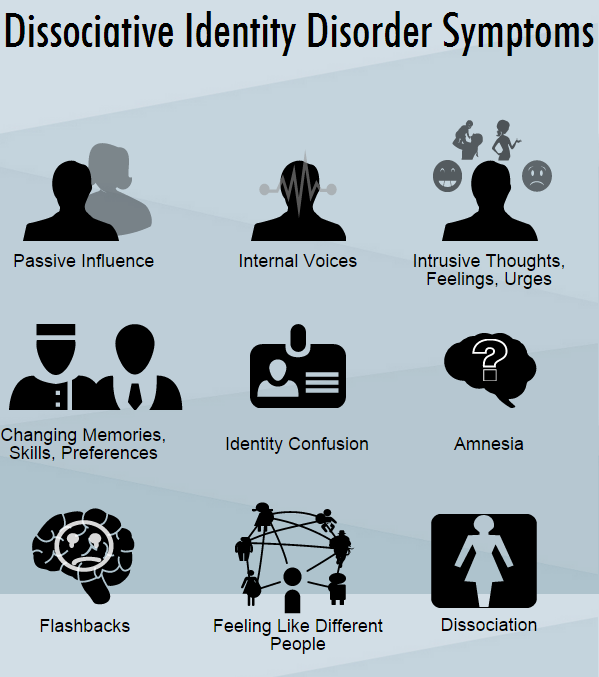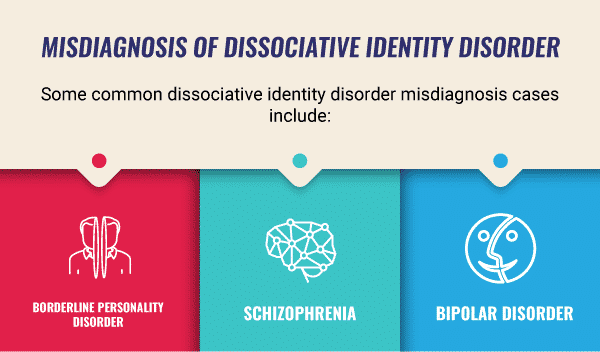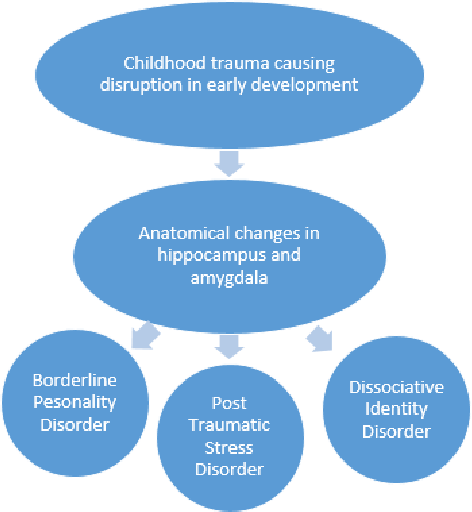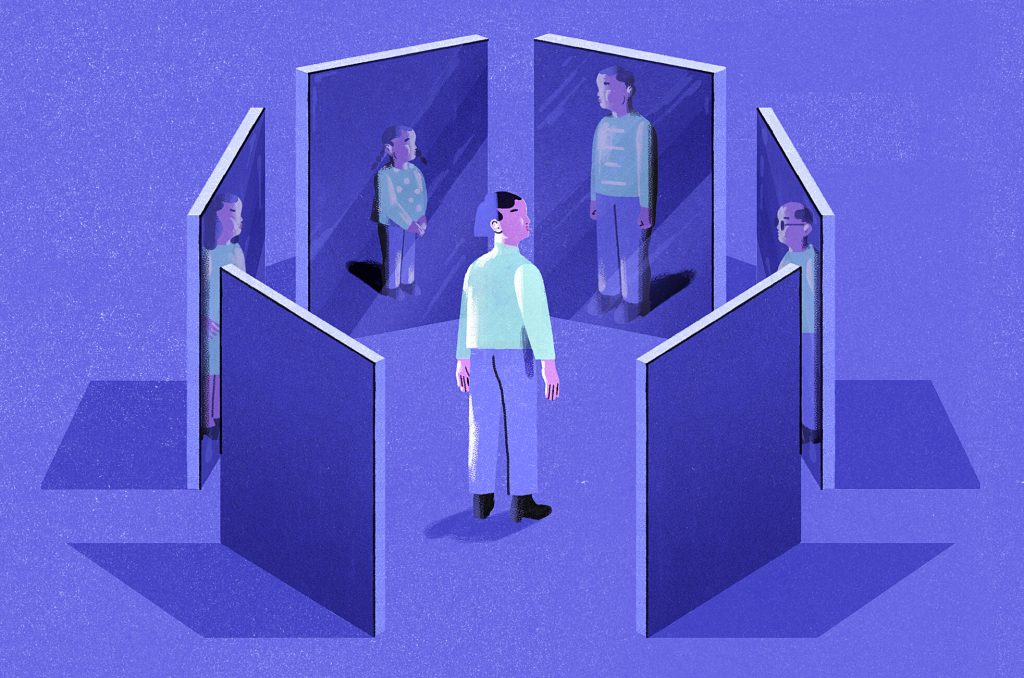Dissociative identity disorder can be very challenging to live with and can impact many areas of life such as relationships, work, and self-care. In this comprehensive guide, we will discuss everything you need to know about dissociative identity disorder including causes, symptoms, treatment options, and more!
Contents
Understanding Dissociative Identity Disorder
Dissociative identity disorder is a mental health condition that is characterized by the presence of more than one distinct identity or personality state. These different identities or personalities can have different thoughts, feelings and behaviors. Furthermore, people with DID often feel like they are living in a fog or dream-like state. Additionally, they have trouble remembering important personal information.
Types of Dissociative Identity Disorder
There are three main types of dissociative identity disorder. TYPE:
- I: This is the most common type and is characterized by the presence of two or more identities. They alternately take control of the person’s behavior.
- II: This type is similar to Type I, but instead of different identities taking control. Thus, there are different personality states within the same identity.
- III: This type is very rare and is characterized by the presence of a single identity that splits into two or more parts.
Degrees Of Dissociative Identity Disorder
There are four degrees of dissociative identity disorder:
Mild: This is the mildest form of DID and is characterized by the presence of two or more identities. It rarely takes control of the person’s behavior.
Moderate: This is a more moderate form of DID and is characterized by the presence of two or more identities. It sometimes takes control of the person’s behavior.
Severe: This is a severe form of DID and is characterized by the presence of two or more identities. It often takes control of the person’s behavior.
Profound: This is the most severe form of DID and is characterized by the presence of two or more identities. It always takes control of the person’s behavior.
Symptoms Of Dissociative Identity Disorder

The symptoms of dissociative identity disorder can vary from person to person, but typically include:
Amnesia: This is the most common symptom and is the inability to remember important personal information.
Depersonalization: This is a feeling of detachment or estrangement from oneself.
Derealization: This is a feeling that the world is not real or that it is altered in some way.
Hallucinations: This is the experience of seeing, hearing, smelling, or feeling something that is not actually there.
Paranoia: This is a feeling of being watched or persecuted.
Confusion: This is a state of mental confusion and disorientation.
Inability To Function: This is the inability to carry out normal daily activities due to the symptoms of dissociative identity disorder.
Risks Of Misdiagnosis

Dissociative identity disorder is often misdiagnosed as another mental health condition such as bipolar disorder, schizophrenia, borderline personality disorder, and post-traumatic stress disorder. Therefore, this can be very dangerous as it can lead to the person not receiving the correct treatment.
NOTE: If you are concerned that you may have dissociative identity disorder, it is important to see a mental health professional who specializes in this condition. Since, they will be able to make a proper diagnosis and can provide you with the appropriate treatment.
Causes Of Dissociative Identity Disorder

There are many different reasons why someone might develop dissociative identity disorder. Some common causes include:
Trauma: People with DID often have a history of trauma, such as physical or sexual abuse.
Neglect: If a child is neglected, they may begin to dissociate in order to cope with the pain and stress.
Genetics: There is some evidence that dissociative identity disorder may be hereditary.
Brain Chemistry: There is some evidence that changes in brain chemistry may contribute to the development of DID.
Factors That Worsen DID
There are a few factors that can worsen dissociative identity disorder:
- Stress: Stress can aggravate the symptoms of DID and make them worse.
- Trauma: Trauma can trigger or aggravate the symptoms of DID.
- Drugs and Alcohol: Drugs and alcohol can worsen the symptoms of DID.
Physiology Of Brain In DID
There are some interesting differences in the physiology of the brains of people with DID when compared to those without the disorder. Studies have shown that people with DID have increased activity in certain parts of the brain, including the frontal lobe and temporal lobe. Furthermore, they also tend to have decreased activity in the hippocampus, which is responsible for memory formation.
Dissociative Identity Disorder Vs. Multiple Personality Disorder
Dissociative identity disorder is often confused with multiple personality disorder, but there are several key differences between the two conditions:
- Dissociative Identity Disorder: This is a mental health condition characterized by the presence of two or more identities that alternately take control of the person’s behavior.
- Multiple Personality Disorder: This is a mental health condition characterized by the presence of two or more personalities that are separate from one another.
DSM On Dissociative Identity Disorder
The DSM (Diagnostic and Statistical Manual of Mental Disorders) is a manual that is published by the American Psychiatric Association. It contains all of the diagnostic criteria for mental health conditions. Furthermore, the most recent edition, DSM-V, includes dissociative identity disorder as a diagnosis.
DSM Criterion For DID
In order to be diagnosed with dissociative identity disorder, a person must meet the following criteria:
A. The presence of two or more distinct identities or personality states.
B. Each identity or personality state has its own relatively consistent pattern of thoughts, feelings, and behaviors.
C. The disturbance causes clinically significant distress or impairment in social, occupational, or other important areas of functioning.
D. The symptoms are not due to the direct effects of a substance (e.g., medication, alcohol) or a general medical condition (e.g., head trauma).
Living With Dissociative Identity Disorder

People with dissociative identity disorder often have difficulty living a normal life. They may struggle with:
Managing emotions: People with DID often have trouble managing their emotions. Consequently, this can lead to a lot of emotional instability and intense mood swings.
Coping with stress: People with DID are often under a lot of stress due to the challenges that come with living with the disorder.
Building relationships: People with DID often have difficulty forming and maintaining relationships due to trust issues. And the fact that they may have different personalities who act differently around different people.
Work: People with DID may have trouble holding down a job due to problems with concentration, memory, and emotional stability.
Impact Of DID On Relationships
People with dissociative identity disorder may have a difficult time forming and maintaining relationships due to the following factors:
Trust Issues: People with DID often have trust issues due to the fact that they have been betrayed by people they trusted in the past.
Different Personalities: People with DID often have different personalities who act differently around different people. This can be confusing and make it difficult for people to form close relationships with them.
Impact Of DID On Work
People with dissociative identity disorder often have trouble holding down a job due to the following factors:
Problems With Concentration: People with DID may have difficulty concentrating and staying on the task due to their dissociation.
Problems With Memory: People with DID may have trouble remembering information due to the fact that their memories go through fragmentation.
Emotional Instability: People with DID often have emotional instability which can lead to problems at work.
Impact Of Dissociative Identity Disorder On Social Life
People with dissociative identity disorder often have a difficult time in social situations due to the following factors:
Mood Swings: People with DID may have intense mood swings which can make it difficult for them to interact with others.
Different Personalities: As mentioned earlier, people with DID often have different personalities who act differently around different people. This can make it difficult for them to form close relationships with others.
Trust Issues: People with DID often have trust issues which can make social interactions difficult.
Impact Of DID On Self-care
People with dissociative identity disorder often have difficulty taking care of themselves due to the following factors:
Problems With Concentration: People with DID may have trouble concentrating on tasks that are necessary for self-care, such as bathing and brushing teeth.
Memory Problems: People with DID may forget to do things or take care of themselves due to the fact that their memories may be fragmented.
Emotional Instability: People with DID often have emotional instability which can lead to problems taking care of themselves.
Coping With Dissociative Identity Disorder
There are a few self-help tips that can be useful for people with DID. Some of these tips include:
Creating a routine: This can help to minimize the chaos that often comes with dissociation.
Staying healthy: This includes eating healthy and getting enough exercise.
Journaling: This can be a helpful way to express what you are feeling and track your progress.
Practicing mindfulness meditation: This can help to focus the mind and calm the body.
Challenging negative thoughts: People with DID often have negative thoughts about themselves. Thus, it is important to challenge these thoughts and replace them with more positive ones.
Join A Support Group: There are often support groups available for people with a dissociative identity disorder. Thus, this can be a great way to connect with others who understand what you are going through.
Talking To a Professional
If you are struggling, it is important to talk to a professional who can help you. There are many professionals who specialize in treating dissociative identity disorder. You can find a therapist who specializes in this disorder by visiting 0ur/any website. Furthermore, you can also contact your local mental health clinic or hospital to find out about available treatment options.
Treatment Options For DID
Some of the treatments that may be available include:
Psychotherapy: This is often the first line of treatment for people with DID. It can help to explore the different personalities and work through the trauma that has caused the disorder.
Medication: There are a few medications that may be helpful for people with DID. These include antidepressants and anticonvulsants.
- Antidepressants: Antidepressants may be helpful for people with DID who have depression.
- Anticonvulsants: Anticonvulsants may be helpful for people with DID who experience seizures or other neurological symptoms.
Brain stimulation therapies: This includes treatments such as electroconvulsive therapy (ECT) and transcranial magnetic stimulation (TMS).
- ECT: ECT is a treatment that uses electrical shocks to stimulate the brain.
- TMS: TMS is a treatment that uses magnets to stimulate the brain.
Hospitalization: In some cases, hospitalization may be necessary to ensure the safety of the person with DID.
Helping Someone With Dissociative Identity Disorder
If you know someone who has dissociative identity disorder, there are a few things that you can do to help them:
Educate yourself about DID: This will help you understand what the person is going through and how best to support them.
Be supportive: Be understanding and supportive of the person with DID. Let them know that you are there for them.
Avoid judgment: Do not judge the person with DID and do not criticize their different personalities.
Be patient: It may take time for the person with DID to open up to you. Therefore, be patient and let them take things at their own pace.
Provide structure: People with DID often need structure in their lives. Thus, try to provide them with a routine and stick to it as much as possible.
NOTE: If you are living with someone who has dissociative identity disorder, it is important to be supportive and understanding. The person with the disorder may need a lot of help and support in order to manage their symptoms. Finally, it is important to remember that people with dissociative identity disorder are not bad or dangerous people – they are simply dealing with a difficult mental illness.
Experts’ View On Dissociative Identity Disorder
There is still some debate among experts about whether dissociative identity disorder actually exists. However, it has been classified as a mental illness by the American Psychiatric Association. But there is some disagreement about whether it is a real disorder or not.
Conversely, there is growing evidence that suggests that it is a real disorder and not just an imaginary condition. Furthermore, some experts believe that dissociative identity disorder may be a result of trauma. Such as child abuse or neglect. However, others believe that it may be the outcome of genetics or a chemical imbalance in the brain.
Case Study

Sarah is a woman who has a dissociative identity disorder. She has five different personalities that she switches between.
Her main personality is Sarah, who is a stay-at-home mom. She has four other personalities: Tom, the tough guy; Karen, the party girl; Luke, the nerd; and Emma, the child.
Sarah often experiences dissociation and has trouble remembering things. Furthermore, she also has a lot of emotional instability and sometimes feels like she is not in control of her own body.
- Tom is the personality that is most dominant when Sarah is in crisis mode. He is very tough and aggressive and often takes over to protect Sarah and her family.
- Karen is the personality that comes out when Sarah wants to have fun. She is very outgoing and loves to party.
- Luke is a nerdy personality who likes to read and study. He often helps Sarah remember things that she has forgotten.
- Emma is a childlike personality who is innocent and naive. She often provides comfort to Sarah when she is feeling upset.
Sarah’s case highlights the challenges that people with a dissociative identity disorder face. Evidently, it can be difficult to manage different personalities and keep them all in balance. However, with hard work and support, it is possible to live a full and productive life with this disorder.
Conclusion
Dissociative identity disorder is a complex condition that can be challenging to manage. However, with treatment and support, it is possible to live a full and productive life. Fortunately, there are many different treatments available for people with DID. So there is sure to be something that will help you. If you are struggling with this disorder, please reach out for help. You are not alone.
A Word From Therapy Mantra
Your mental health — Your psychological, emotional, and social well-being — has an impact on every aspect of your life. Positive mental health essentially allows you to effectively deal with life’s everyday challenges.
At TherapyMantra, we have a team of therapists who provide affordable online therapy to assist you with issues such as depression, anxiety, stress, workplace Issues, addiction, relationship, OCD, LGBTQ, and PTSD. You can book a free therapy or download our free Android or iOS app.


